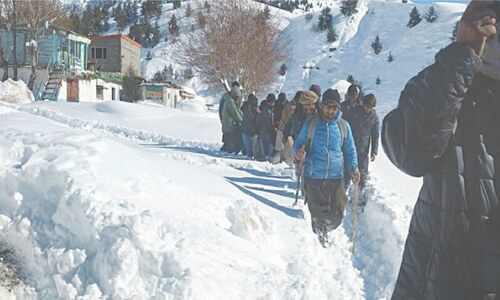WASHINGTON: A top commander warned Monday that looming budget cuts and misguided military planning could potentially cripple the US Army if reductions in troop levels are taken too far.
General Ray Odierno, the Army's chief of staff, railed against chronic financial uncertainty facing the military due to political deadlock and said more automatic budget cuts could possibly render the country's ground forces unable to carry out vital missions.
“It has to do with the amount of money that we're provided,” Odierno told a news conference when asked about the possible effect of budget cuts.
“And there's going to come a time when we just simply don't have enough money to provide what I believe to be the right amount of ground forces to (carry out)... contingency operations,” he said.
“But we'll see, we're not there yet.”The next round of sweeping automatic budget cuts, known as the sequester, are due to take effect in January unless Congress breaks an impasse over taxes and spending. The Defense Department could see some $21 billion slashed.
More than any other branch of the military, the US Army, the largest of all the armed services, is in the cross-hairs as officials look for savings to comply with the funding reductions.
The Army is already weighing a possible reduction in the active duty force from a wartime peak of 570,000 troops to 420,000, but Defense Secretary Chuck Hagel has said the Army could shrink to 380,000 in a worst-case scenario.
The Pentagon chief has said the budget cuts will force a difficult choice between scaling back manpower or giving up funds to maintain the military's technological edge.
At a hearing before the House Armed Services Committee last month, Odierno said even the reduction to 420,000 active duty troops would “put at substantial risk our ability to conduct even one sustained major combat operation.
”Military planners are now reviewing options as part of a “Quadrennial Defense Review,” a study conducted every four years that tends to shape decisions on Pentagon spending.
Odierno said he and other commanders were taking part in the review but he castigated some unspecified proposals that would have the budget cuts come with drastic reductions to the Army's troop numbers.
“There are lots of different opinions out there. There are people that want to change how the Army fights, and they believe we don't need ground forces, that we can do everything with technology, stand-off weapons, missiles,” he said.
“I can tell you emphatically I absolutely disagree with that. I think that's a grave mistake if we head in that direction. I think it's irresponsible, frankly.”
Army Secretary John McHugh told the same news conference that budget pressures will mean all the service's weapons programs would be delayed or even canceled, including high priority projects for a new armored vehicle and new communications networks.
“I find it difficult to envision any significant number of our developmental initiatives that won't be affected,” the secretary said. “And some we'll have to cancel.”
Monday's comments from Army leaders reflect growing alarm by senior officers that budget reductions could seriously weaken the ground force, which bore the brunt of the wars in Iraq and Afghanistan over the past decade.
Under current plans, the Army has already committed to shrinking to 490,000 troops over five years. The US Marine Corps is due to fall to 182,000 troops from 202,000.

















































